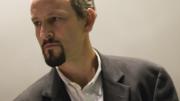The division of investigative oversight in the Office of Research Integrity (ORI), in the U.S. Department of Health and Human Services, has found that former Harvard professor of psychology Marc Hauser “engaged in research misconduct” in research supported by several federal grants. Hauser resigned his Harvard position in 2011 following a separate, internal Faculty of Arts and Sciences investigation in 2010 that found him “solely responsible” for “eight instances of scientific misconduct under FAS standards." (See comments on the investigation by Hauser and FAS at the bottom of this article.)
Hauser studied the evolution of language and cognition, in research involving monkeys and humans. In the year between the FAS findings and his resignation, he was on leave; he had planned to return to Harvard after his leave, but resigned following a psychology department faculty vote against having him resume teaching duties.
- Hauser fabricated half the data in a bar graph in a research paper on learning by cotton-top tamarins, published in 2002 in the journal Cognition. (The paper was retracted in 2010.)
- Hauser “falsified the coding” of some monkeys’ responses to sound stimuli in two unpublished papers. The report says Hauser acknowledged to collaborators that he had miscoded some of the data, and that the experiment did not support the initial hypothesis.
- Hauser “falsely described” the experimental methodology used to code results for two experiments in a manuscript submitted to Cognition, Science, and Nature. All the problems with the descriptions of the work were corrected prior to final submission and publication in Cognition in 2007.
- Hauser “falsely reported the results and methodology” for one of seven experiments in a paper published in Proceedings of the Royal Society B in 2007. Hauser “takes full responsibility for the falsifications reported in the published paper.” He and coauthors replicated the findings with complete supporting data, and published the results in 2011 in the same journal.
- Hauser “accepts responsibility for a false statement” in the methodology description of one experiment in a Science article in 2007; Hauser and a coauthor later replicated the results with full supporting data and published them in the same journal in 2011.
- Hauser “engaged in research misconduct” by inconsistently coding data in an unpublished experiment, “falsely changing the coding results.” The research was recoded, Hauser acknowledged to collaborators that “his coding was incorrect,” and the research was not written up for publication.
According to the report, Hauser “neither admits nor denies committing research misconduct but accepts ORI has found evidence of research misconduct” as detailed in the report and has entered into a voluntary settlement (not an admission of liability) under which he will, for three years:
- have any U.S. Public Health Service (PHS) research supervised, in a manner agreed to in advance by the PHS;
- have any institution employing him submit a certification that data, procedures, and methodologies from his work are accurately reported, before funding applications are submitted or efforts are made to publish research; and
- exclude himself from serving in any advisory capacity to PHS or its committees.
The report is to be published in the Federal Register tomorrow.
The Boston Globe, which first reported the news of Harvard’s investigation, reported on the ORI findings this morning. (The Globe's subsequent, more detailed story, is here.) While the federal investigation was under way, Harvard could not comment on its own investigation or the detailed findings of misconduct.
Updated 2:25 p.m. The Globe is now reporting a statement by Marc Hauser in response to the the ORI report. In reads, in part:
The investigation process required me to review, analyze and respond to questions concerning significant amounts of data, manuscripts, grant applications, and personal correspondences covering more than ten years.
Although I have fundamental differences with some of the findings in the ORI report, I acknowledge that I made mistakes. I tried to do too much, teaching courses, running a large lab of students, sitting on several editorial boards, directing the Mind, Brain & Behavior Program at Harvard, conducting multiple research collaborations, and writing for the general public. I let important details get away from my control, and as head of the lab, I take responsibility for all errors made within the lab, whether or not I was directly involved. I am saddened that this investigation has caused some to question all of my work, rather than the few papers and unpublished studies in question. Before, during and after the investigation, many of my lab’s research findings were replicated by independent researchers. I remain proud of the many important papers generated by myself, my collaborators and my students over the years. I am also deeply gratified to see my students carve out significant areas of research at major universities around the world.
Updated 4:30 p.m. The Faculty of Arts and Sciences issued this statement on the investigation:
As Dean [Michael D.] Smith said two years ago, no university or college wants to see a member of the faculty found responsible for research misconduct, for such misconduct strikes at the core of our academic values. Rigid adherence to the scientific method and scrupulous attention to the integrity of research results are values we expect in every one of our faculty, students, and staff. The Office of Research Integrity’s findings reported in today’s Federal Register end the investigative process begun by Harvard by confirming Harvard’s conclusions of research misconduct with respect to certain of Dr. Hauser’s NIH-funded research.









